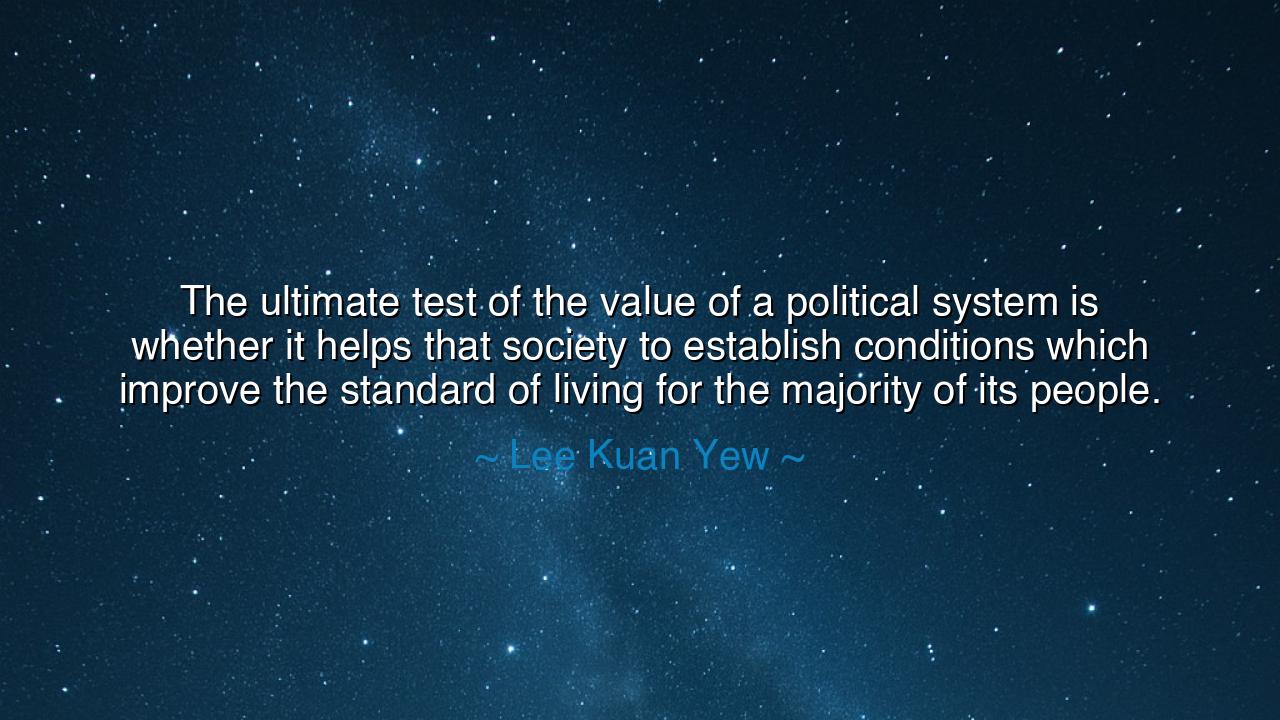
The ultimate test of the value of a political system is whether
The ultimate test of the value of a political system is whether it helps that society to establish conditions which improve the standard of living for the majority of its people.






Lee Kuan Yew, the founding father of modern Singapore, once declared: “The ultimate test of the value of a political system is whether it helps that society to establish conditions which improve the standard of living for the majority of its people.” These words are not spoken in the abstract—they rise from the lived struggle of a leader who inherited a fragile, impoverished nation and, through unyielding discipline and vision, transformed it into one of the most prosperous societies of the modern age. His insight pierces through ideology and rhetoric to reach the heart of governance: the true worth of any system lies not in its name, but in its fruits.
The meaning here is as timeless as it is practical. Too often, men argue over the superiority of monarchy or republic, of socialism or capitalism, of democracy or authoritarianism. Yet Lee reminds us that these labels, however noble or adorned, are hollow if they do not improve the lives of the people. A political system must not be judged by its theory, its slogans, or its elegance in books, but by its ability to create conditions of dignity—food for the hungry, work for the able, shelter for the poor, and hope for the majority. Without this, no system, however praised, can claim legitimacy.
History is replete with examples of this truth. Consider the French Revolution. The monarchy of France clothed itself in grandeur and divine right, yet failed the test of Lee’s measure. While the nobility feasted, the majority of peasants starved. The system did not provide even the most basic standard of living for its people, and thus it collapsed beneath the weight of its own injustice. Out of that ruin came turmoil, blood, and finally, a new order. It was not ideology that destroyed the monarchy, but its failure to nourish the people.
In contrast, look to the rebuilding of Germany and Japan after the Second World War. Both nations, defeated and humiliated, rose not merely because of military surrender but because of new systems that focused on raising the standard of living for ordinary citizens. With support for education, healthcare, housing, and employment, societies that once lay in ashes became engines of prosperity. The political systems they adopted proved their worth not in the elegance of their design, but in the flourishing of their people.
Lee’s own Singapore stands as a living parable of his words. A tiny island without natural resources, torn by poverty and division, had little chance of survival. Yet through governance that prioritized stability, education, public housing, and opportunity, Singapore became a beacon of prosperity. The ultimate test was not whether its system resembled the West or the East, but whether it lifted the majority into a life of dignity and progress. And by that measure, it succeeded.
The lesson for us is stern yet hopeful. Do not be seduced by empty rhetoric or by political systems that exalt theory over practice. Ask always: does this system improve the lives of the many, or does it serve only the few? A government that fails to uplift the majority is like a tree that bears no fruit—impressive in height, perhaps, but worthless to the hungry who sit in its shade. True governance is measured by its compassion, its pragmatism, and its results.
Practical action flows from this teaching. As citizens, demand not only promises but outcomes. Support leaders and policies that invest in education, healthcare, infrastructure, and opportunity for all. Judge systems not by ideology but by their service to humanity. And in your own sphere—your family, your community, your work—remember that leadership, too, is tested by whether it raises those around you, or only enriches yourself.
Thus, let Lee Kuan Yew’s words endure as a guide: “The ultimate test of the value of a political system is the standard of living it provides to the majority.” Carry this truth, and you will see through the illusions of power. For in the end, the worth of any system lies not in what it claims to be, but in what it does for its people. A civilization that remembers this will flourish; one that forgets will wither, no matter its name or creed.






AAdministratorAdministrator
Welcome, honored guests. Please leave a comment, we will respond soon